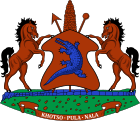|
Politics of Lesotho
Politics of Lesotho takes place in a framework of a parliamentary representative democratic constitutional monarchy, whereby the Prime Minister of Lesotho is the head of government, and of a multi-party system. Executive power is exercised by the government. Legislative power is vested in both the government and the two chambers of Parliament, the Senate and the National Assembly. The Judiciary is independent of the executive and the legislature. Executive branch
The Lesotho Government is a constitutional monarchy. The Prime Minister, Sam Matekane, is head of government and has executive authority. The King serves a largely ceremonial function; he no longer possesses any executive authority and is proscribed from actively participating in political initiatives. According to the constitution, the leader of the majority party in the assembly automatically becomes prime minister; the monarch is hereditary, but, under the terms of the constitution which came into effect after the March 1993 election, the monarch is a "living symbol of national unity" with no executive or legislative powers; under traditional law the college of chiefs has the power to determine who is next in the line of succession, who shall serve as regent in the event that the successor is not of mature age, and may even depose the monarch. Legislative branchParliament has two chambers. The National Assembly has 120 members, elected for a five-year term, 80 in single-seat constituencies and 40 by proportional representation. The Senate has 33 nominated members. Political parties and electionsGeneral electionsThe elections were postponed in the Stadium Area constituency following the death of the Basotholand Total Liberation Congress candidate. The ruling All Basotho Convention lost all its constituency seats, including that of party leader Nkaku Kabi.[1] Although the Democratic Congress party ran its campaign opposing the ABC, the party's recent support for the coalition government allowed the new Revolution for Prosperity (RFP) party to seem more credible as a new start.[2]
Judicial branchThe constitution provides for an independent hierarchical judicial system. The judiciary is made up of the High Court of Lesotho, the Court of Appeal, magistrate's courts, and traditional (customary) courts which exist predominantly in rural areas. There is no trial by jury; rather, judges make rulings alone, or, in the case of criminal trials, with two other judges as observers. The constitution also protects basic civil liberties, including freedom of speech, association, and the press; freedom of peaceful assembly; and freedom of religion.[3] The Court of Appeal is located in Maseru and consists of a President and 6 justices of Appeal. The High Court has unlimited original jurisdiction over civil and criminal matters, as well as appellate jurisdiction from the lower courts and comprises a Chief Justice and other puisne judges. Parallel to the High Court is the Labour Court, which is a specialist court dealing exclusively with industrial and labour matters. Magistrates Courts are presided over by judicial officers (magistrates) employed as civil servants. They are not courts of record and as such their decisions are not binding on future cases. The Chief Justice and Justices of the Court of Appeal are appointed by the King on the advice of the Prime Minister. Puisne judges of the High Court are appointed by the King on the advice of the Judicial Service Commission. High Court judges may retire any time after attaining the age of 75 but may be removed from office by the King for malfeasance or infirmity.
Administrative divisionsFor administrative purposes, Lesotho is divided into 10 districts, each headed by a district secretary and a district military officer appointed by the central government and the RLDF, respectively. The districts are: Berea, Butha-Buthe, Leribe, Mafeteng, Maseru, Mohales Hoek, Mokhotlong, Qacha's Nek, Quthing, Thaba-Tseka International organization participationLesotho is member of ACP, AfDB, C, CCC, ECA, FAO, G-77, IBRD, ICAO, ICC, ICRM, IDA, IFAD, IFC, IFRCS, ILO, IMF, Intelsat (nonsignatory user), Interpol, IOC, ITU, NAM, OPCW, SACU, SADC, United Nations, UNCTAD, UNESCO, UNHCR, UNIDO, UPU, WFTU, WHO, WIPO, WMO, UNWTO and WTO. It was also member of the WCL and OAU before they disbanded. Notes and references
Literature
Information related to Politics of Lesotho |
||||||||||||||||||||||||||||||||||||||||||||||||||||||||||||||||||||||||||||||||||||||||||||||||||||||||||||||||||||||||||||||||||||||||||||||||||||||||||||||||||||||||||||||||||||||||||||||||||||||||||||||||||||||||||||||||||||||||||||||||||||||||||||||||||||||||||||||||||||||||||||||||||||||||||||||||||||||||||||||||||||||||||||||||||||||||||||||||||||||||||||||||||||||||||||||||||||||||||||||||||||||||||||||||||||||||||||||||||||||||||||||||||||||||||||||||||||||||||||||||||||||||||||||||

